




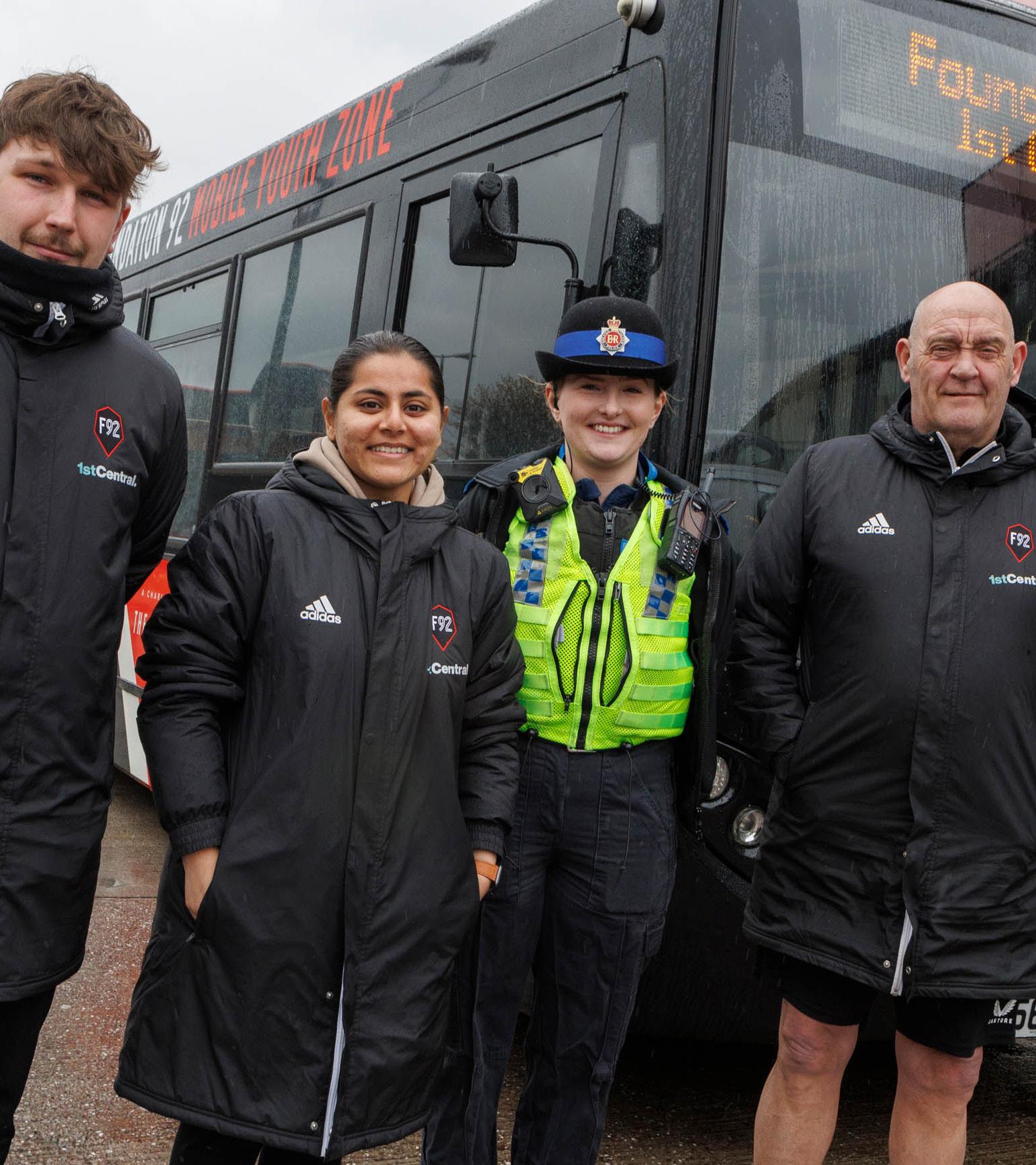
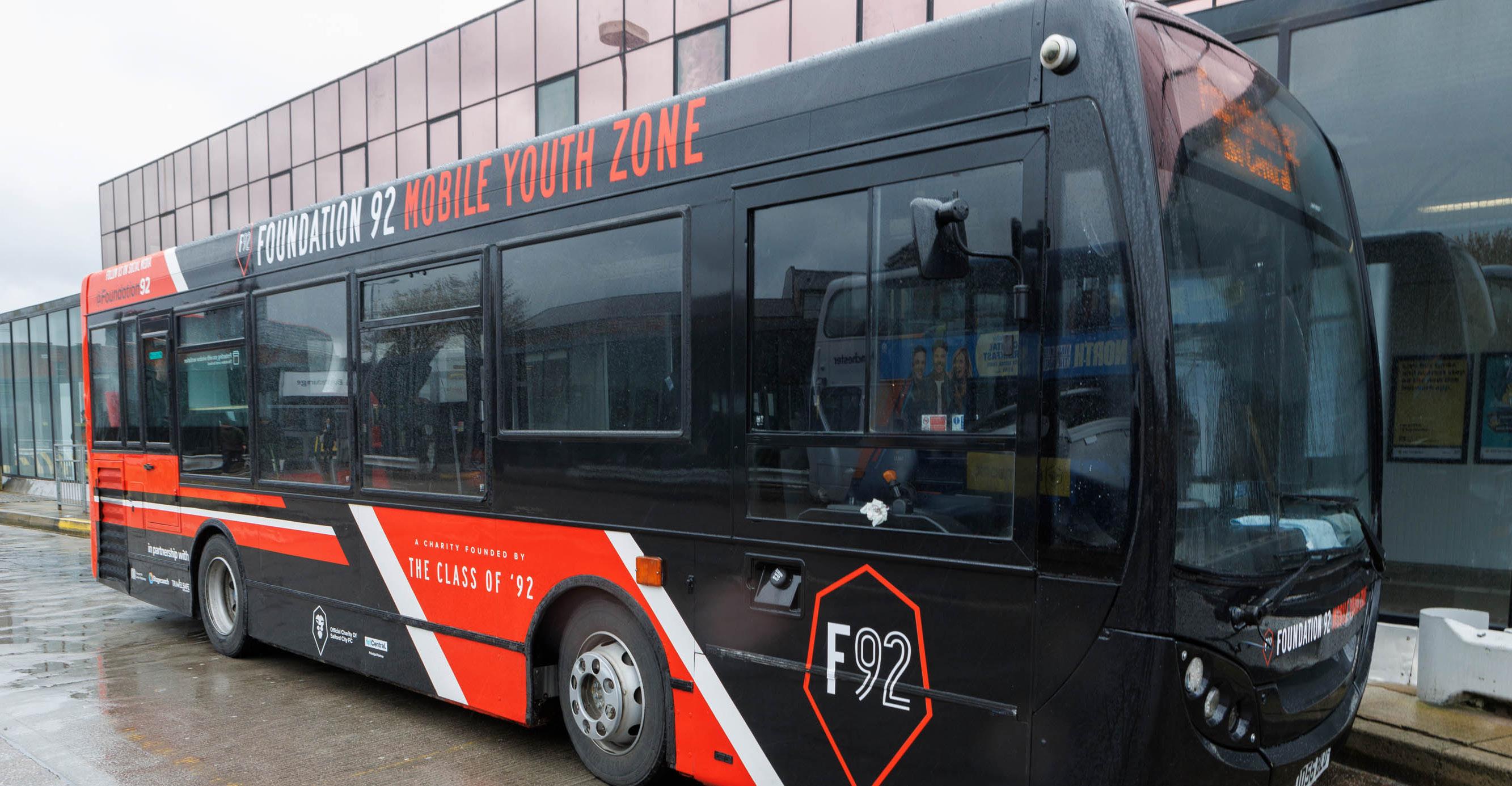
I’m pleased to have been asked to give the Commander’s update for this newsletter which focusses on the safeguarding world.
Dealing with children is an emotive subject and can be extremely frustrating, but my plea to you all is to treat children like children.
The attention on child protection has ramped up recently as GMP has a HMICFRS inspection in the near future. The scrutiny on my world has increased significantly, however this applies to everyone who has any contact with children in whatever capacity i.e. as victims, suspects, witnesses and particularly children who are missing from home.
A local authority may take legal proceedings to take a child into its care if deemed at risk of significant harm. This usually follows a safeguarding investigation and is ultimately decided by a court, but is one of the most significant steps any public body can take to remove a child from their family or carers.
We work in partnership with the local authority and take the lead in criminal proceedings through our specialist investigators.
Behind every stat there is a child and if we are dealing with them, then they are at risk of harm. All that being said, our performance for Child protection is really strong as a district. We are leading the way for GMP in the last few months, and this will only get better.
We have recently appointed DS Adam Stanfield as our subject matter expert for PIP1 child protection crime. You will see a lot of him on the response floor as he is there to support and guide you for any child protection matter. Likewise, our CPIU is there for advice and guidance around all things to do with child protection; I’m seeing more and more response colleagues in there asking for support - please drop in if you need help!
Chief Inspector John D CharltonOn Thursday 18 April 2024, dedicated officers from Programme Challenger executed warrants across the district, as part of Operation Avro, where five residential properties were searched.
Op Avro is the force-wide blitz on local crime which runs in a different district each month by delivering a surge of extra resources and specialist officers.
Last month, Op Avro returned to Bury where Tactical Aid Units (TAU) were deployed at the addresses, and searches ended with successful results.
Subsequently, five people were arrested, £1,640 in cash was seized, £15,728 was recovered in assets, and approximately £2,825 of class A and class B drugs were seized also.
Officers, and all involved, were thanked for their hard work and professional attitude in what was a long day for many.
Detective Sergeant Craig Murray, of GMP’s Programme Challenger Unit, said: “The Challenger Team, supported by other department colleagues at Bury, engaged in search warrants at addresses, in order to tackle organised criminality that contributes to the harm caused to young people in our communities.
“The dedicated officers from Bury
arrested five suspects, recovered approximately £2,800 of class A drugs and £17,128.00 of suspected criminal proceeds in the form of cash and assets.
“Activities on days such as Child Protection Avro highlights the already great work being carried out day-to-day by the officers at Bury. We will continue our relentless pursuit of those involved in organised crime, the exploitation of young people and the contributors of harm to our communities.
“Programme Challenger is Greater Manchester’s response to tackling serious and organised crime. It tackles all manner of serious crime: county lines, exploitation of young children and vulnerable adults, modern slavery, immigration and economic crime and the use of firearms.”
As part of the day of action, other proactive police work included officers from Bury Complex Safeguarding Team, and partners, who attended five vape shops where they seized 2000 vapes worth over £15,000.
Thanks to the team and partners involved; these results showcase the proactive work they do in engaging with communities to help make Bury a safer place for children and young people.
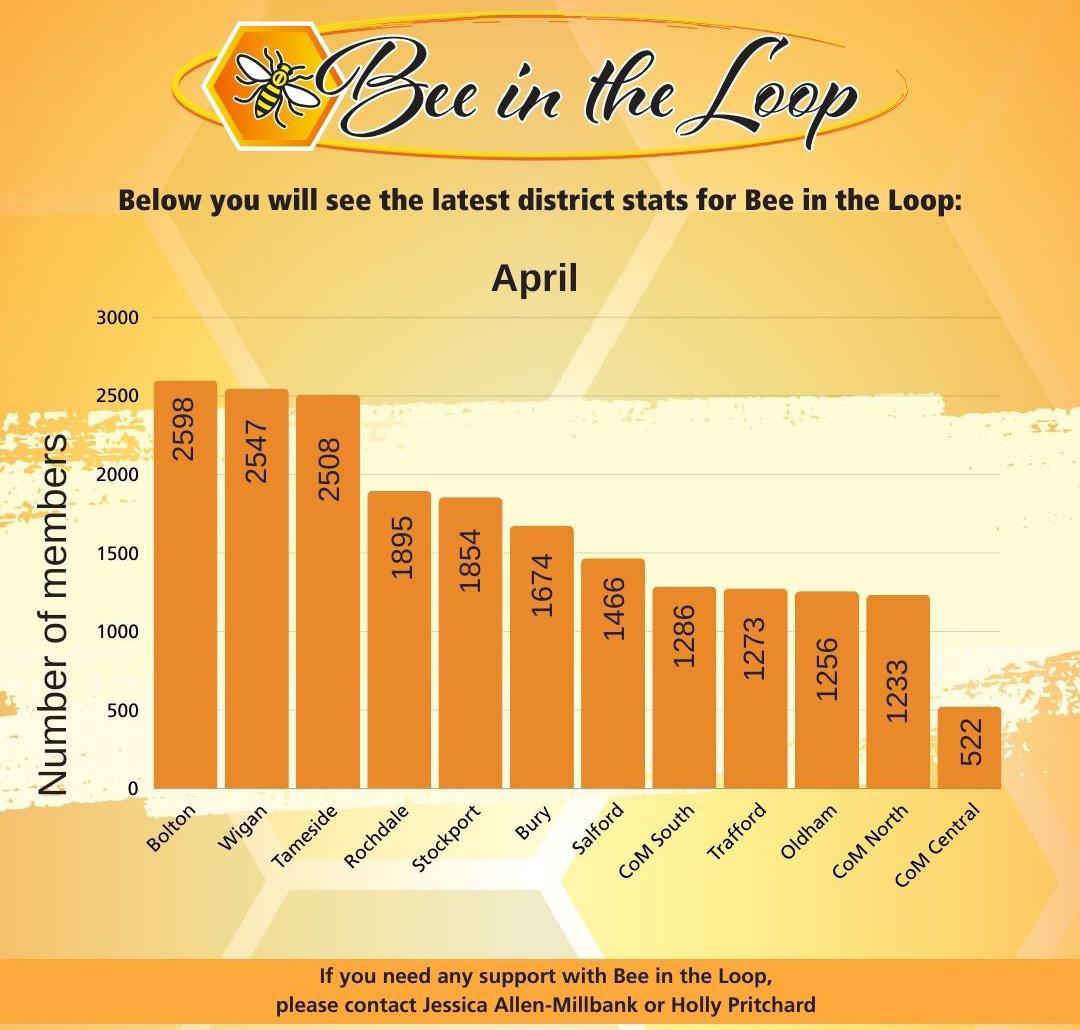
In May 2022, following an intense fire at Bismark House Mill in Oldham which took four days to extinguish fully, demolition workers found human remains at the site.
A thorough investigation by GMP’s Disaster Victim Identification team found that the remains were of four Vietnamese men, Cuong Van Chu, Uoc Van Nguyen, Duong Van Nguyen and Nam Thanh Le, who had been reported missing around the time of the fire. They were victims of modern slavery, exploited and locked in the building by organised criminals; among the most vulnerable in our society.
In March, officers and staff involved in Operation Logan –the retrieval and repatriation of the four men’s remains to their families in Vietnam – were recognised in an awards ceremony at Nexus House. A month later, GMP’s Awards team celebrated the hard work of the operation’s other unsung heroes: victim recovery dogs Cleo (left) and Archie (right, retired) and their handlers, PC Gareth Greaves and Mark Richardson (retired). Gareth, Mark, Archie and Cleo convened at GMP’s Hough End facility to receive their well-deserved commendation certificates – and, for Archie and Cleo, a ceremonial squeaky ball.
Operation Logan was a particularly complex case for all involved, and the dogs were no exception. The fire had been extensive, taking four days to extinguish, and officers sifted through a total 4,500 tonnes of rubble to find the victims’ remains. The team was working through the heatwave of July 2022, with average temperatures of 200C and highs of 360C

Celsius. The debris included the remains of a tile shop which had burned down in the fire, so the teams had to contend with shards of shattered tiles and the residual fumes from burned ceramic.
“We were there for 12 to 14 hours a day, at the height of summer – every day Cleo was coming home with scratches and injuries to her paws, and then the next day she would go straight back out and do it again,” Gareth said. “Dogs don’t always know when it’s best for them to stop working for the day, so she would have kept going for even longer if I’d let her.”
In recent weeks five-year-old Cleo has distinguished herself again, covering around 42 miles of ground in Salford as part of the ongoing investigation into body parts found around the area. Gareth described her as “very loving – but hard as nails. She is a working dog.”
Archie is 11 and has now retired from the force along with Mark, his handler. “He seems like a real grump, but he is the softest, loveliest dog. My kids love him,” Mark said. “He’s independent, hard-working and eager to please – he is very easy to love and very rewarding to work with.”
The crucial, often harrowing work of the victim recovery team is commonly overlooked or misunderstood. “The job does get to you sometimes,” Mark said.
Gareth added: “People don’t always realise what we do or what it means, so we’re lucky to have a close-knit team who support each other. At the heart of it, our job is bringing the lost home.”

Each month, GMP’s Operation Avro deploys extra resources in a single district in a proactive drive to target the crimes that matter the most to our communities.
In April, for the first time, Op Avro launched across the force in a bid to tackle criminal and sexual exploitation and safeguard young people.
Using high visibility, resource-intensive and proactive policing, we launched an action-packed day of activity across Greater Manchester, focusing on child protection and safeguarding.
The day started at 5am, with warrants across the force targeting people suspected of sexually or criminally exploiting young people. In total, 33 individuals were arrested for a variety of offences including serious sexual offences and rape, indecent images offences, and possession with intent to supply class A and B drugs.
The team was joined by PD Ted, Cheshire Constabulary’s ‘digital dog detective’, whose specialist skills help us identify hidden digital devices which may be used to hold illegal images. With devices becoming smaller, and criminals becoming more adept at concealing them, these skills are an excellent asset to our investigations.
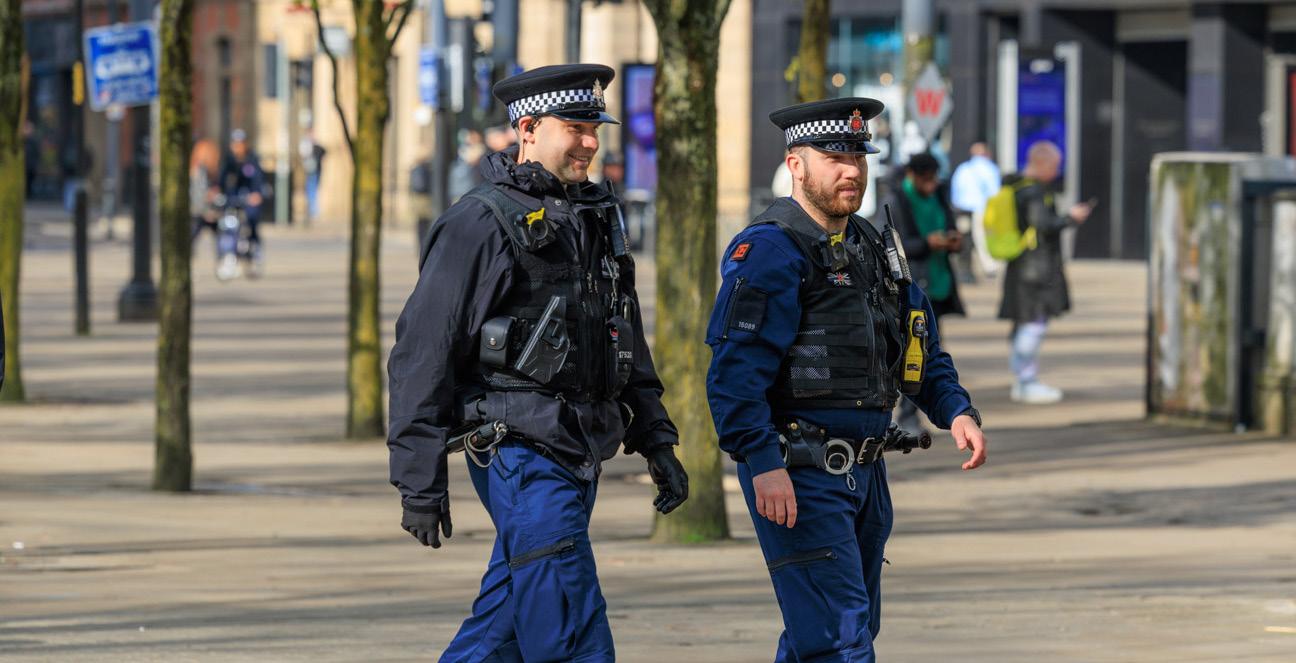
Proactive operations in Bury and Rochdale saw officers and staff from our dedicated complex safeguarding teams partner with local authority Trading Standards officers to visit several shops suspected of selling vapes to underage children – this is a priority as it can often lead to children being coerced into criminal activity or sexual exploitation.
In total, £20,000 worth of amount of illicit or non-compliant vapes were seized, along with illegal sweets and imitation firearms.
Teams across the force delivered training sessions to hoteliers, businesses and taxi licensees to make sure they were equipped with the tools and confidence to challenge inappropriate
behaviour and feel confident knowing what to look out for when they come into contact with young people.
Our specialist behavioural detection teams were deployed to hotspots across the force, with a focus on reducing youth violence. To compliment this, our Complex Safeguarding Teams delivered several workshops in local primary and secondary schools, discussing important topics such as healthy relationships, staying safe online, and how criminal gangs look to exploit young people.
Education and engagement are key to preventing and addressing exploitation before it takes hold, and we intend to continue this critical work in our communities, talking to as many people as we can who may be the first
point of contact for young people at risk of exploitation. If we can increase awareness of the signs that a child may be at risk, ensure we’re asking young people the right questions in the first place and provide a safe space for them to talk, we have a better chance at protecting them from harm.
The training school at Sedgley Park held two events for officers and staff, providing inputs on recognising the signs of child abuse, listening to children and understanding the impact of adverse childhood experiences.
With more resources and increased investment into tackling exploitation and protecting children from harm, we are working around the clock to face these issues head on. From improving
training for frontline officers, ensuring they stay professionally curious to maximise chances of early intervention, to specialist detectives targeting online predators, we are taking advantage of the breadth of experience and resources we have across the force, with one common goal of safeguarding young people from harm.
DCI Suzanne Keenaghan, force coordinator for child protection, said: “We want to empower our communities to be alive to the signs of exploitation, provide avenues for them to report concerns to us and our partners, and most importantly, instil public confidence to know that we will act upon any intelligence that they give us.
“Sadly, people will always seek to exploit children and vulnerable people, but I am confident that we have rigorous safeguarding mechanisms in place across
Greater Manchester, and relentless teams of detectives and frontline officers who are pursuing offenders.
“At the heart of the work we do is building trusted relationships with the children and young people who are at risk. The activity today gave us the chance to speak to thousands of people in our communities, take criminals off the streets, and build on our intelligence picture about children who are facing or experiencing exploitation. With help from our partners and the public, we have seen significant results today and we will continue to build on this as not to become complacent.”
• While this is not an exhaustive list, some signs of exploitation include:
• Changes in behaviour or appearance
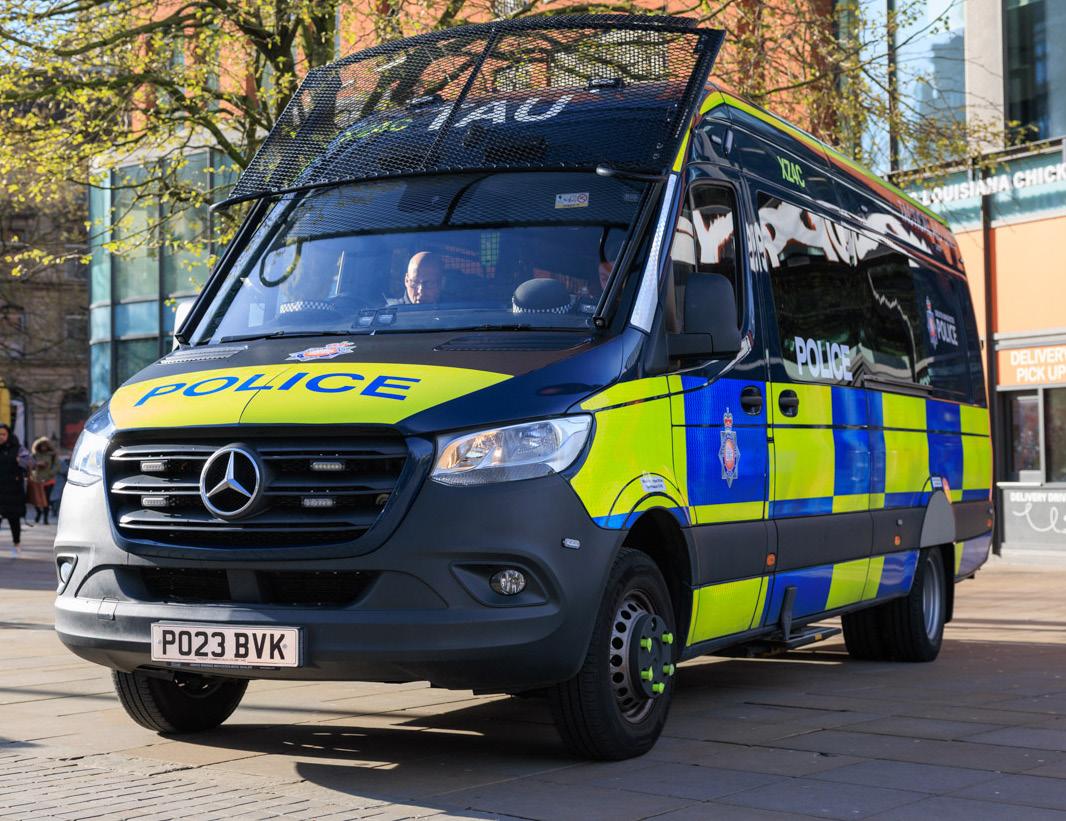

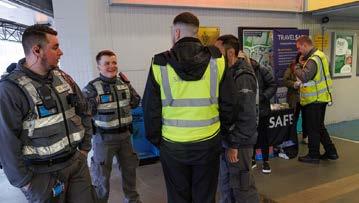
• Not coming home when they say they will, or going missing
• Becoming uncharacteristically secretive or reluctant to talk about friends or relationships
• Struggling to engage in school
• Overly protective of their messages or social media accounts
• Having more than one phone
• Accompanied by individuals older than them
• Concerns surrounding the use of alcohol or drugs
• Sudden changes or fear of people or friends
• Unexplained gifts or money
• Uncharacteristic or age-inappropriate sexual discussions or language
• Evidence of sexual images being shared (by themselves or by others)



Right Care, Right Person (RCRP), a national programme which aims to ensure that individuals in need receive the right care from the right agency, will launch at GMP on 17 June.
In preparation for the launch, it is mandatory that all GMP officers and staff complete the short RCRP training course available on College Learn at https://www.learn.college.pnn. police.uk/CL/Content/Summary/47978. If you have any queries, please email the project team at RCRP@gmp.police.uk.
Please be aware that Right Care, Right Person has not yet gone live and no changes currently need to be made to the way we work.
Once RCRP has launched, staff in the FCCO will benefit from the support of expert floorwalkers, who will provide guidance and insight where needed into all aspects of the policy. Ahead of the rollout, you can learn some more about them below:
Abigail Smith (Abi)
RCRP will be a big step in the right direction for both the force and the public. They are getting the right help sooner; there will be more officers free to deal with crime, and fewer calls coming into the FCCO.
I aim to support my colleagues the best way I can with the understanding I have around RCRP. I know a lot of people will be worried about this coming in and thinking about repercussions and worst case scenarios; I will reassure them that they are supported by the policy.
Chloe Goulden
To me, RCRP means that GMP can now focus more closely on fighting crime and saving lives of people in immediate danger.
RCRP is very important for our force as it helps us use our resources and officers for their intended purpose. My colleagues can expect my full support while rolling out RCRP – I will be on hand to help explain any unclear incidents which arise and offer my advice on how to best serve the public through RCRP.
Once RCRP is fully rolled out and all staff have settled in, it will be a massive benefit to GMP forcewide.
Matthew Jones
RCRP means that the police can provide the right support to the public and help to fight crime, while also making sure the concerned party gets the correct support. It is a positive change to the force and
can be daunting, but the policies in place are aligned to go smoothly.
I will always be on hand to make sure my colleagues have full support whenever it is needed, answer questions without judgement and help to guide them through the correct avenues.
Thomas Caldecott
RCRP means that the people in our communities receive the correct care from the correct agency – some of the training we’ve received has clearly shown that police attendance isn’t always the best way to help people, and can sometimes even make things worse. It will also help GMP be able to respond to actual policing needs.
I will be on hand to offer support with any aspect of RCRP whenever it is needed.
Nathan Cortes
RCRP not only makes our jobs more effective, it’s also there to help the people we serve by getting them the right help as soon as possible, rather than passing them through multiple agencies, which delays the help they need. For GMP it’s important because we can use our resources to spend more time helping those who truly need us.
During any massive culture change, even small details can seem like a big challenge. This is what the floorwalkers have been trained for: to assist with questions and offer clarity during this changeover period. We will be walking around the room looking to help anyone who wants to clarify anything or are

unsure if they are making the right decision.
If I could say one thing to those who will be working with me, it is that there is no such thing as a bad question.
Almas Barker
RCRP will help police officers to get back to policing and help victims instead of sitting in a hospital for hours, freeing up more police to work on the beat, protect the public and prevent crime.
I will give my colleagues 100% as a floorwalker and support them in their decision-making. My advice to my colleagues would be to read more about the changes coming on the intranet RCRP hub, and check Sherlock – but do not hesitate to ask supervisors and floorwalkers. Attend the training sessions if you can, as they are very interesting and the trainers are always happy to hear your views.
Sam Grice
RCRP will bring a positive change to GMP by enabling officers to focus on tackling crime and provide a better service for victims.
It will enable people who are suffering from mental health, social and care needs to access services which are trained to support them faster.
I believe my skills as a trainer and mentor will assist my colleagues in the room.
Hayden Leigh
RCRP to me means one thing: a safer environment for the people of Greater
Manchester, enabling them to receive the care they need firsthand from the right agency. It also means police officers will be able to carry out their duties correctly and in a timelier manner for those who need the police for policing purposes, giving us and members of public better access to the resources we need.
As a floorwalker, call handlers can expect my full support, and more importantly a helping hand to reassure they are doing the right thing in the correct manner.
We are a team, and we have an at times challenging job with a duty of care to the members of public who need our help. I will help in any way possible to make sure I and my colleagues are equipped to give that care to the public.
Imogen Stone
RCRP means the public get the right support where they need it without feeling criminalised.
The support I can offer to colleagues while I’m on the floor in the FCCO will include answering questions if something feels confusing: an issue we may have

put on a Grade 1 in the past could no longer be something that the police force deal with; some call handlers may disagree with this, but I am there to explain why this is the case and what they need to do to get the caller the correct care and assistance in that moment of need.
I have been trained in what we will keep doing and what we will no longer deal with, so I will use this training to help others across the floor.
Please don’t feel afraid to ask any questions: this is a change affecting the whole of GMP, and we floorwalkers are here to support and help on the jobs you may have questions about.
Natalie Aker
RCRP means there will be more resources available to deal with incidents that are meant for the police.
I will be there to help colleagues with any questions and filling in the forms; I will help them in the best way I can with the knowledge gained from my training.
During the training sessions I have been engaging in conversations and

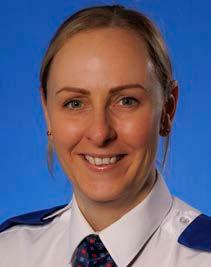



asking questions that I feel colleagues may ask me when I am floorwalking, so I can give them an informed answer.
Dalien Haughton
Simply put, RCRP involves getting the right care for the right person!
This means we will be providing a better service to members of the public and signposting them towards the appropriate help – this also free up crucial resources to attend the core functions of policing.
During go-live period I will be one of the floorwalkers in the FCCO; I am here to help with any questions that you may have. I cannot promise I know all the answers, but I will endeavour to work with call handlers during this challenging period and help to get clarity on anything you may be unsure of.
Row 1: Abigail Smith, Matthew Jones, Tom Caldecot, Hayden Leigh, Dalien Haughton,
Row 2: Samantha Grice, Chloe Goulden, Craig Gandy, Natalie Alker, Natalie Alker, Natalie Alker, Nathan Cortes.




GMP’s groundbreaking veterans’ initiative is set to become a national protocol, with its next iteration rolling out in Cumbria in early May.
The Forcer Protocol is a practice used by the police to ensure that key information is available when searching for service veterans who are lost or have gone missing. GMP was the first police force in the UK to adopt the protocol, which was initially implemented as a sixmonth pilot.
The protocol is named after Alan Forcer, a former soldier who took his own life after being reported missing in 2020. Alan suffered with complex PTSD, extreme anxiety, physical pain, and debilitating depression after serving in Northern Ireland and Kosovo as a teenager. Some months before his death, he was informed that the charity which had been providing him with mental health assistance would no longer be able to do so due to funding issues.
The Forcer Protocol follows this approach:

How much do you know about TRiM at GMP?
Trauma Risk Management (TRiM) is a confidential, peer-delivered risk assessment and ongoing support system, provided by GMP to help in the management and support of staff and officers after an on-duty traumatic event. While TRiM is not a clinical intervention, counselling, or formal psychological treatment, it does allows qualified peers to conduct structured risk assessments and identify likely reactions to potentially traumatic events. Its aim is to identify those people that need early support and assist them in receiving it.
How does it work?
When notified of an incident via the TRiM email, a TRiM manager starts the process.
1. When a person is reported missing to the FCCO, the call handler will then ask whether the missing person is a veteran in every case as part of the initial assessment.
2. Next, the log is switched to GMP’s Force Operations Centre, where the staff will check Safe and Found Online information aggregation platform for crucial information about the veteran.
3. The district will then identify the risk, investigate, and locate the missing person safe and well.
4. Finally, a referral is then completed on a Single Veteran’s Pathway to ensure that the veteran gets the correct support they need.
Due to the success the Forcer Protocol has achieved with GMP, it is now being rolled out at Cumbria Constabulary as it becomes a national protocol.
Ch Insp Mark Mangnall, who has played a huge part in the design and implementation of the protocol, said:
For larger incidents, a planning meeting will be arranged within the first 24 to 48 hours after an event. The planning meeting is held to identify those involved, understand the incident and its characteristics, and agree a tailored response. Some people who have been involved with the incident may be invited to take part in a risk assessment.
Larger groups may be asked to attend a TRiM incident briefing (TIB), where they will be provided with information on the incident and advice on how to manage their own emotional responses. TRiM ensures that there is a coherent, considered approach to the organisational response. The TRiM assessment is a chance to have a structured, non-judgmental, relaxed and confidential chat with a peer, about the incident you have been involved in.
Staff and officers should not be referred to TRiM immediately after an incident, as people deal with traumatic events in different ways. Normal supervisory welfare should be used and if an individual requests TRiM, then a
“Countless hours of hard work have taken place in the design phase and implementation of the Forcer Protocol.
“Since it went live in November 2023, we have identified and located 68 vulnerable missing veterans. It fills me with pride that its success has gained recognition from the NPCC and nationally by other police forces. Cumbria Constabulary is the first force after the GMP pilot to adopt this protocol within their force area, paving the way that I am confident many will follow in the near future.”
referral should be made to trim@gmp. police.uk.
The TRiM assessment will not take place until at least 72 hours after the event; this gives individuals time to process what has happened.
The TRiM team within GMP is currently made up of Force TRiM Coordinator Tracy Harris and Senior Mental Health Specialist Glenys Wright. There are also 58 TRiM practitioners available whenever you need them.

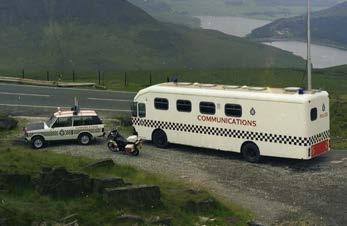
This year the team’s Wellbeing on Tour is coming to you earlier in the year than usual, and will be spread across three weeks due to the bank holiday. You can find a list of where we will be and on what dates below; please keep an eye on the intranet over the coming weeks for more details of what the events will entail and who will be in attendance on each day.
• Bury: Friday 17 May
• Rochdale: Monday 20 May
• Oldham: Tuesday 21 May
• Nexus House: Wednesday 22 May
• Stockport: Thursday 23 May
• City of Manchester: Friday 24 May
• Stretford: Tuesday 28 May
• Swinton: Wednesday 29 May
• Wigan: Thursday 30 May
• Bolton: Friday 31 May
Oscar Kilo: Once upon a time
Over the last few months, in accordance with its commitments under the Police Covenant, Oscar Kilo (OK) has been developing a programme of support for police families.
Following in-depth research to understand some of the challenges policing families face, OK launched its OK family life programme in November, which brings together resources and support for families and friends of police officers – from nutrition guidance for the

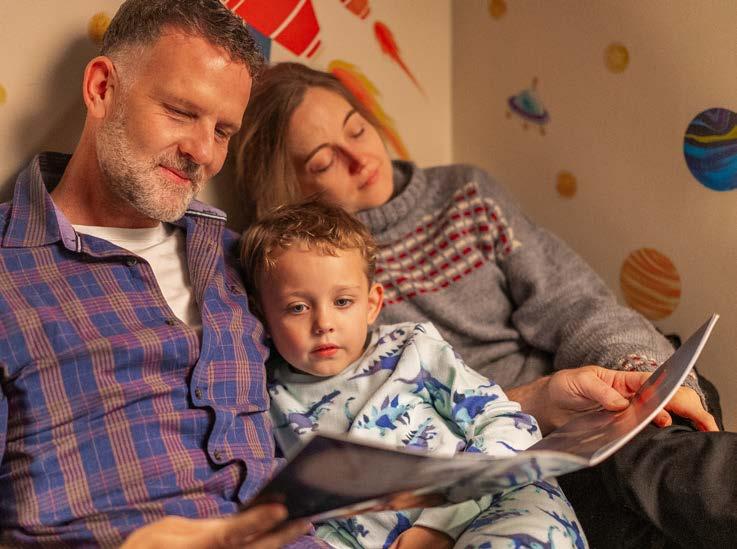
whole family, to advice and workarounds for living with someone working shifts, to advice on mental health and identifying the signs of work stress and trauma in a loved one.
One key issue that the research has highlighted is that a simple acknowledgement of how tough it can be on all members of the family, including children, really helps. It can mean people feel less alone and more seen.
This is why Oscar Kilo has introduced its ‘Once upon a time’ campaign, which aims to help policing families explain to children why their loved ones might sometimes have to miss out on mealtimes, bedtimes or family celebrations.
As we all know, it’s not always possible for people working in policing to be around for a bedtime story; and it’s important that children understand why this might happen.
That’s why, Oscar Kilo launched its new campaign, centred around Red Robber Raid: a children’s book written and illustrated by the wellbeing team at Norfolk and Suffolk Constabulary, which gives families a chance to share a special bedtime story and explore together why a parent or carer might miss out on mealtimes, bedtimes, or other family time.
This campaign follows on from Oscar Kilo’s initial launch of its new online family hub in November and its ‘Thank you’ campaign at Christmas, which offered police forces, officers, and staff
the chance to say thank you to their families and friends and recognise the support they give every day to their loved ones in policing.
Oscar Kilo: new online hub for retirees and leavers
Oscar Kilo is delighted to launch its new leavers’ hub, offering resources to support both police staff and officers as they retire or leave policing.
The online hub offers advice and support through every stage of a leaver’s journey, from initial thinking about next steps, to creating a CV, networking, interviews, and wellbeing.
Providing support to those who are leaving or who have left policing is a key pillar of the Police Covenant, which recognises the unique contribution and sacrifices that both police officers and police staff make as a result of their service.
To create the online hub, Oscar Kilo worked with chartered psychologist Dr Ceri Jones and former chief superintendent Stuart Noble. Between them, the two have more than 20 years of experience helping those moving on from policing and other public sector organisations.
The leavers hub builds on our work to help police forces provide world-class wellbeing support for everyone who works for them.
You can view the Oscar Kilo leavers’ hub at https://www.oscarkilo.org.uk/ leaving-the-police.
What is your role in the FCCO?
I am a constable in the Force Operations centre.
What was your experience in the force before joining FCCO?
Prior to joining the Force Operations Centre, I worked on the Bolton district. My previous roles were in response; the public service team (appointment-based resolutions); Bolton task force (plain-clothes proactive work); integrated neighbourhood policing team; Bolton town centre neighbourhood; and Great Lever neighbourhood.
What attracted you to join the FCCO?
I was looking for a new challenge, to learn new skills, and develop myself further. I spoke to a friend and colleague who had just joined the branch, from whom I learned that it was a new team, established following the Kerslake inquiry after the Manchester Arena bombing. It aims to support and assist the force duty officer (FDO) in dealing with a variety of incidents, up to and including Operation Plato (The national response to a marauding terrorist attack).
What are your responsibilities?
My principal responsibilities include assisting with GMP’s response to major, critical and significant incidents by cascading information to our partner agencies and activating the Force Command Module. As a force public order loggist, I can assist with logging duties either in Silver Control or when deployed to an incident to support a Bronze command team. My day-to-day responsibilities include having oversight of significant incidents within the force, assisting with forcewide resourcing issues, assistance with high-risk missing persons, phone work and AtHoc image distribution. I undertake dynamic tasked research from the FDO and force critical incident manager (FCIM) in relation to fast-time intelligence checks, firearms research packages, Police National Database (PND) and other GMP systems interrogation. I also conduct day-today administrative tasks, such as preparation and presentation of the force daily management meeting (DMM) and force daily summary.
What is an average day like for you?
An average day in the Force Operations Centre revolves around working to support the FDO, FCIMs, senior leaders and district officers in a rapid and effective manner, providing whatever support and assistance we can offer with access to a multitude of systems. In truth there are no average days – the work is interesting and varied.
What is the biggest challenge of working in the FCCO?
Personally, my biggest challenge was developing myself to become comfortable with the numerous systems and IT that we use in the centre. Along with the systems that all officers will be aware of, such as iOPS, PND and other common research tools, there are other systems that we use in relation to major and critical incidents; such as Resilience Direct, which I use to inform and integrate with our partners – potentially up to a cabinet level.
The support and help that I have received within the team to learn and progress with the systems has been constant. I was new to how the FCCO integrates as a team, for example how
incidents come in via call handlers, and the effective distribution of the incident, and how that further links to partner agencies becoming involved, and the assistance they can offer.
What skills or qualities do you need to work in the FCCO?
For me, key qualities are a willingness to learn and to support our colleagues, senior officers and partners. However, anyone from any background, either operational or specialist would quickly fit into one of the five teams within the Force Operations Centre. We all bring diverse skills and experiences, and therefore learn and develop from each other. The transferable skills I have now are far greater than the ones I joined with.
Lastly, why would you recommend the FCCO to officers? It is completely different from anything I have done previously. I assist with incidents that I wouldn’t normally have become involved with. The partnership working required here is invaluable and provides good examples for anyone with promotional aspirations. The number of new systems that I can now access and interrogate to benefit others, has been put to effective use.
I have been fully supported in retaining and developing my previously acquired skills including Level 2 public order, National Public Order Evidence Gatherer, and force loggist. Along the way I was fortunate enough to become one of two GMP National Interoperability Liaison Officers (NILO), a course provided by the Fire Service at their training college, which equipped me with a unique insight to their role and the support they can offer the police.
Lastly, as I personally approach the twilight of my career, it’s fulfilling to be involved with a productive team. I firmly believe that we make a positive difference to force operations on a regular basis.
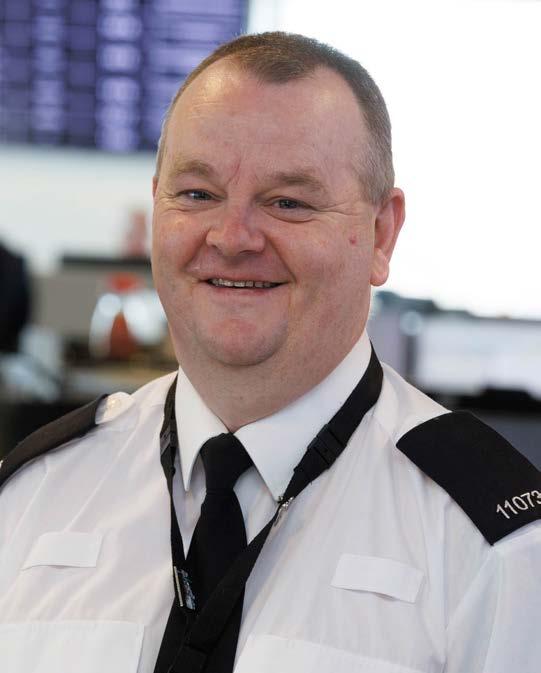
In April, Child Protection officers in Bury worked alongside partners to carry out vital work visiting children and young people to raise awareness around issues such as knife crime. Neighbourhood beat officers conducting Operation Fabric placed a knife arch at Bury College to cause disruption to those who may be carrying a blade, and to help support the college in protecting its students and keeping them safe from knife crime.

The arch is used to detect weapons and was placed at the entrance of the building where well over 200 children and young people passed through it.
Meanwhile, the Foundation 92 busthe official charity partner of Salford City FC - stopped off at Bury Interchange, where it provided young people with a safe space to spend time with friends and play games.
Officers took this opportunity to interact with young people and break down the barriers between the youth and police, while also speaking with partner agencies to build relationships and trust.
Police Constable Kay, who spoke with young people on the bus and joined in with some of the games, said: “I like working with young people in the community as it allows us to build trust and confidence and make people realise that the police aren’t just there to arrest
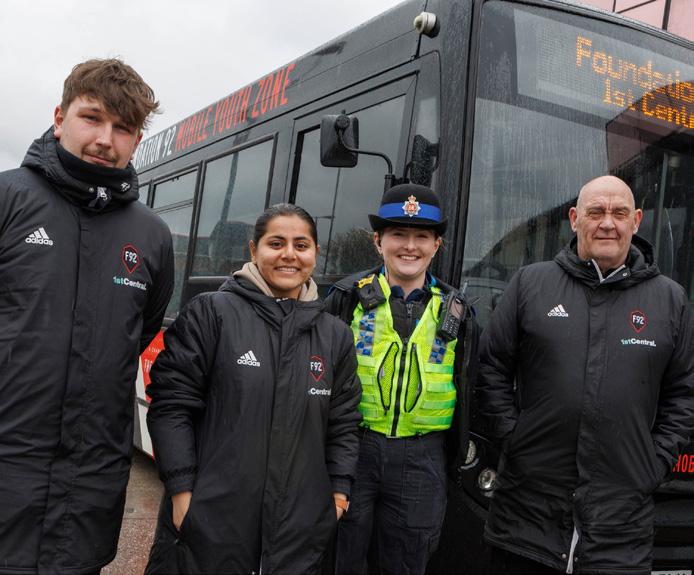
people.
“It also allows us to act as a positive role model for young people who may not have them in their home life. By getting to know the young people in the community it builds trust and respect.”
Numerous other visits were also carried out across Bury by the Complex Safeguarding Team; Neighbourhood PCSOs; CPIU and youth outreach workers, to offer support to young people through workshops in a fun, friendly and engaging way.
Right Care, Right Person (RCRP) will launch at GMP on Monday 17 June 2024.
To ensure the whole force understands GMP’s new position under RCRP, all officers and staff in public-facing and training roles are required to complete a 15-minute online training package via College Learn – this mandatory online training needs to be completed by Friday 31 May 2024.
The course can be found at https://www.learn.college. pnn.police.uk/CL/Content/ Summary/47978 or by scanning the QR code below.
Managers and supervisors are
expected to provide officers and staff with protected time to complete the training, which should take no longer than 15 minutes. DRMUs and training co-ordinators are expected to track completion and compliance and issue reminders to staff in their areas who are yet to complete the training ahead of the deadline.
Right Care, Right Person (RCRP) is a new national approach in policing, co-ordinated through the National Police Chiefs’ Council and supported by the College of Policing. It provides an accountable and consistent decision-making model which will be applied at the
very first point of contact, when the report is made to the police. The model will ensure individuals receive the right support by the right organisation, at the earliest opportunity through police forces working closely with partners, including local authorities, NHS trusts and mental health agencies.
More information can be found on the RCRP hub on the force intranet.
IMPORTANT: do not apply any Right Care, Right Person principles to incidents until after the launch date on Monday 17 June 2024.
The RCRP project team can be reached via RCRP@gmp.police.uk.


Bury Adult Safeguarding Unit remain top of the force for domestic violence protection orders and achieving positive results for victims of domestic abuse incidents.
This is thanks to the dedication and commitment of Detective Inspector Wright and Detective Sergeant Galley, who received the Building Trust and Confidence award at the district ceremony in January.
DI Wright and DS Galley have proactively extended the remit for the department by ensuring longer DA appointments, continuing to identify
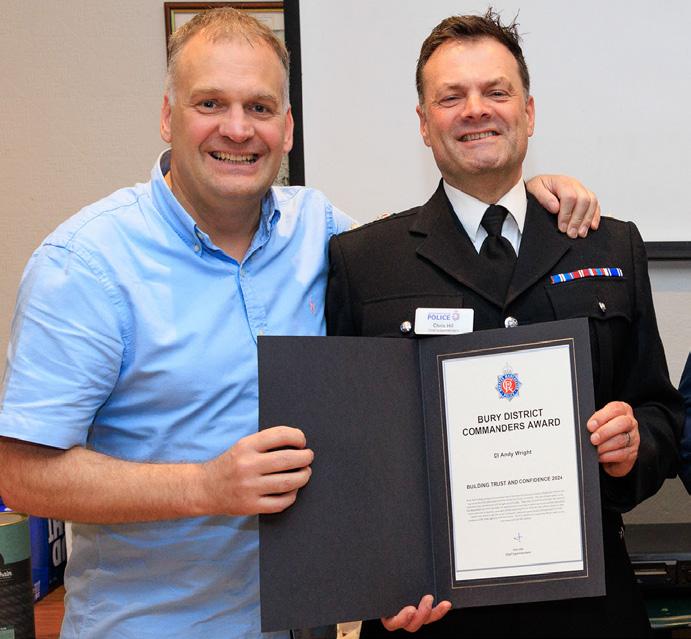
vulnerable victims and building up the trust and confidence of other agencies, as well the victims.
This is in addition to supporting officers with arrests, interviews, and case file reviews. Furthermore, DS Galley has pro-actively put DVPO’s on the forefront of officer’s minds resulting in the protection of victims.
Back in November 2022, DI Wright was asked to design and implement the Adult Safeguarding Unit at Bury where he was joined by DS Galley. The pair have since worked closely together for what has been a successful journey in designing, implementing, and selling their ideas to officers and the Senior Leadership Team (SLT).
The current model, with the help and buy in from response officers has made Bury consistently one of the top performers for positive outcomes.
About what it means to be awarded for being top performers in getting positive results for victims, DI Wright said: “To me, it means the victims who are hurt, silenced, and intimidated by these crimes
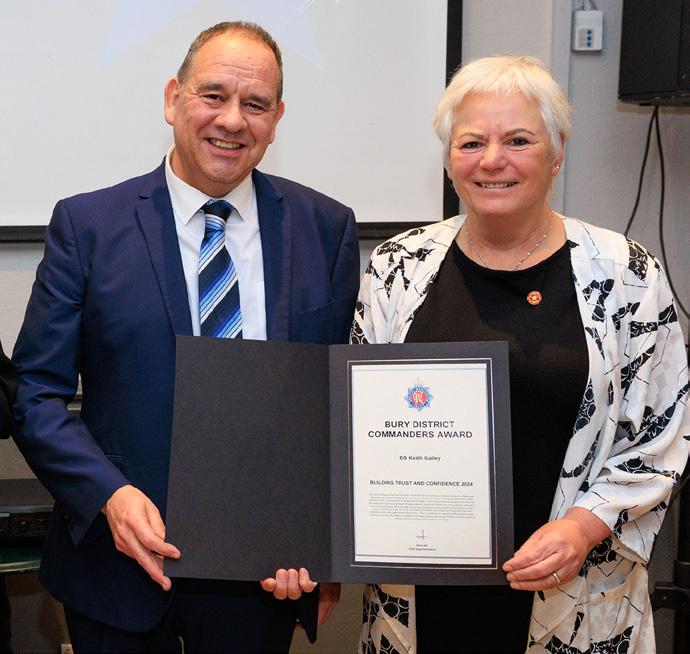
are receiving the best service possible, and that offenders are brought to justice.
“While it is nice to be recognised for our work, we know the effort we continually put in is for a reason, and we hope the results speak for themselves. Every positive outcome hopefully means we have a victim who is now smiling and safe.
“When peers from other districts visit and ask us what we are doing different with DA at Bury and want to see our model model, it means it’s all been worthwhile.”
Money seized by GMP is distributed to forces via the Asset Recovery Incentivisation Scheme (ARIS), which is in turn used to invest in communities across Greater Manchester.
This means district forces can provide exciting opportunities for local community groups to bid for a portion of the money to help give something back to residents.
In March 2024, a host of non-profits across Bury were able to apply for funding from the £20,000 via ARIS to support their local groups for up to 12 months of activities.
The criteria to receive the funding means activities must support GMP’s objectives of fighting, preventing, and reducing crime; keeping people safe; and caring for victims.
A Dragons’ Den-style event was held at Clarence Park Cafe where each group had to pitch to a panel of judges made up of officers and councillors. Non-profit community groups which applied for the funding included projects supporting veterans, elderly members of the Asian community, offering gym
memberships and classes to young people to steer them away from a life of crime, and many more.
Applicants were given just a fiveminute time slot to convince the panel to fund their proposed activities.
The successful community groups were then presented with a cheque for the cash sums they had been awarded.
Successful applicants this year were: Supporting Sisters, One Step, The Met, Jinnah Day Care Centre, North West Life Education, Crown Veterans Breakfast Club, Project Free, Bury Defence Academy, Caritas Red Door and The BAME Project.
The Jinnah Day Care Centre, which helps support elderly members of the Asian community deal with health issues, was awarded £2,500. Mr Imtiaz Hussain, Manager of Jinnah Day Care Centre said they were ‘so happy’ to receive the funding.
He said: “The money will be used to help improve the health and wellbeing of older people in the Asian community. Elderly people within the community are more likely to suffer from diabetes, high blood pressure and heart conditions.
“We want to help promote a healthier lifestyle by holding yoga and exercise classes for our service users and providing them with more information on health and diet by experts.
“We have over 200 service users and over 90% of them have diabetes. We need to be more than just a day centre for Asian elderly people and help them take care of their health.”
Inspector Abed Hussain, from GMP Bury, said: “This event proved an excellent opportunity for projects in Bury to benefit from ARIS and support their local communities.
“Offenders often commit crimes for their own financial gain, so this is an important part of the criminal justice system and ensures we can give something positive back to our communities.”
